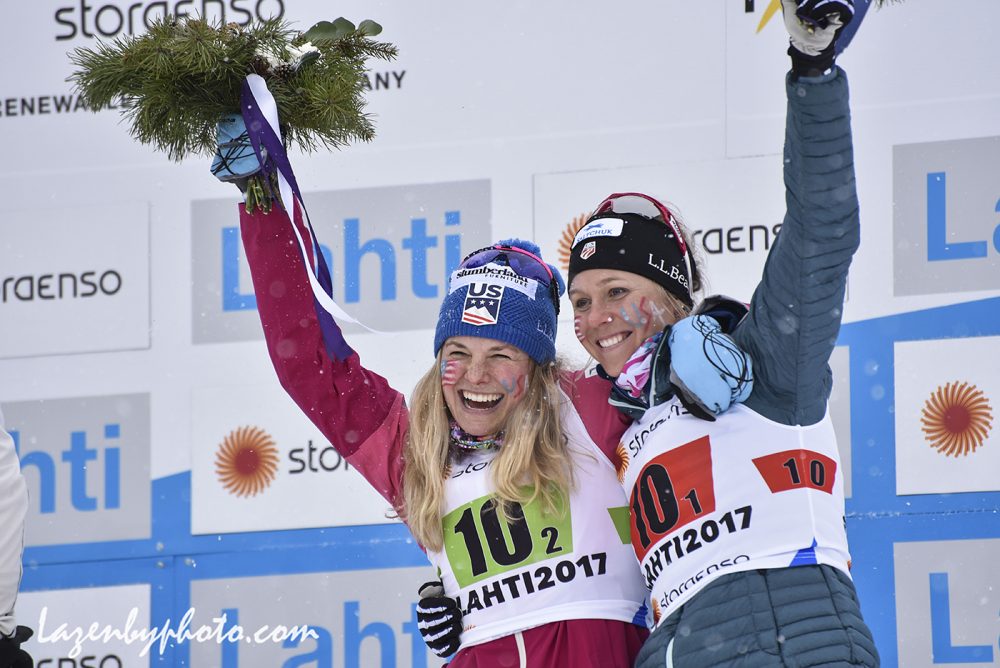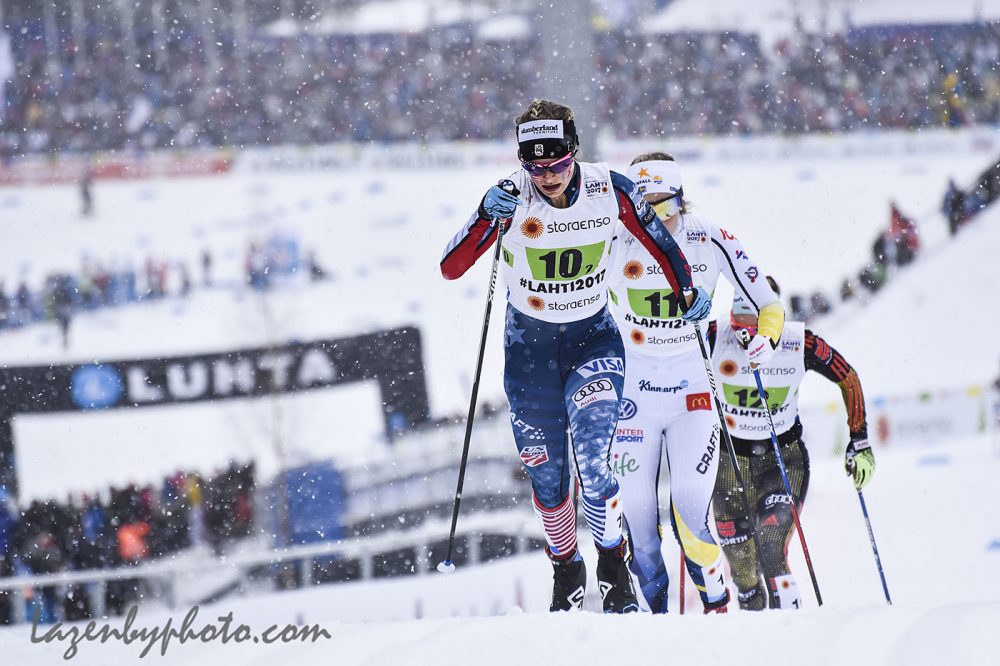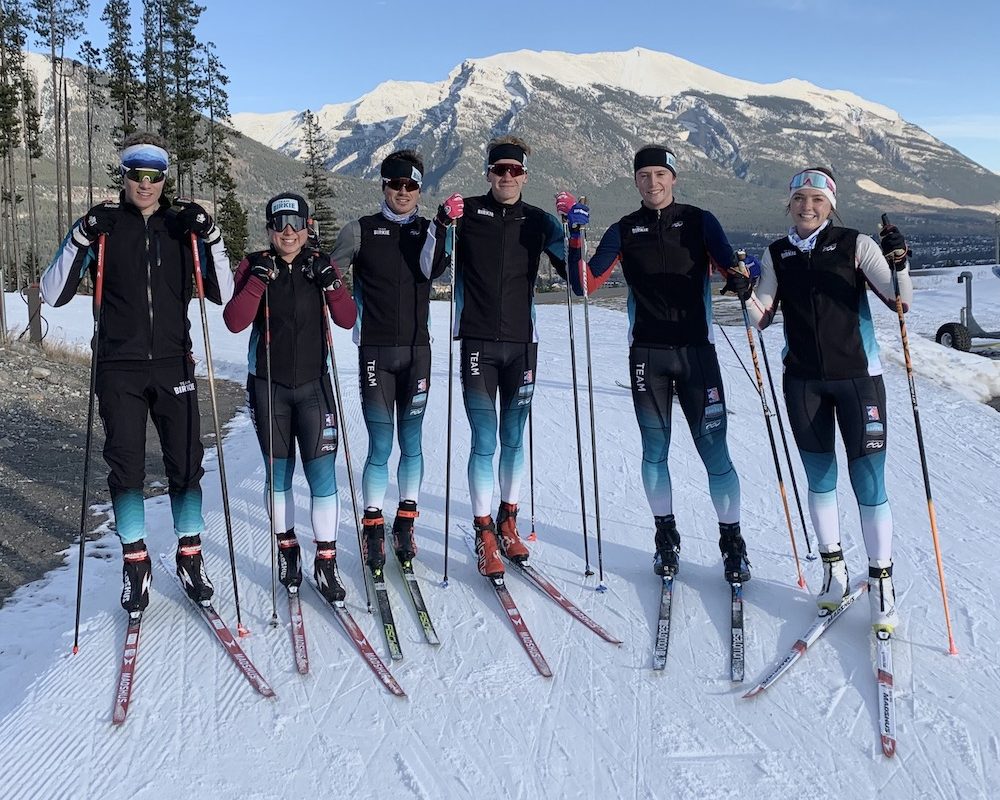
LAHTI, Finland — Statistically speaking, most might have bet on the Swede — particularly if it came down to a lunge to the line. After all, that’s how Sweden’s Stina Nilsson won her first World Cup sprint against Norway’s 2017 sprint world champion Maiken Caspersen Falla.
On two other occasions, Nilsson has skate sprinted to the win in a photo finish — once during last year’s Ski Tour Canada and the other during this season’s freestyle sprint in Falun, Sweden. Perhaps most memorably, it’s also how the Swede won her first classic sprint title, denying Norway of a podium at this season’s opening World Cup weekend.
Considering her finishing history, if Sunday’s 2017 Nordic World Ski Championships 6 x 1.3-kilometer classic team sprint came down to a lunge, Nilsson as Sweden’s anchor was ready.

And when Nilsson’s white suit cornered the final turn centimeters behind that of American Jessie Diggins, some saw Sweden on the podium with bronze.
Even less than a year ago, the U.S. saw themselves as an outside contender for the 2017 World Championships classic team sprint, according to U.S. Ski Team women’s coach Matt Whitcomb. American success in freestyle team sprints was a little more palpable after Diggins and Randall took gold at the 2013 World Championships in Val di Fiemme, Italy, while the year before that, Randall and her U.S. teammate, Sadie Bjornsen finished second during a regular World Cup event in Düsseldorf, Germany.
The U.S. team’s best team-sprint result following 2013 World Championships was fifth in last year’s freestyle team sprint in Planica, Slovenia, with Sophie Caldwell and Ida Sargent. Never before had the U.S. women medaled in a classic World Championships event.
“This was an event that, in April, we talked about as an outside medal shot,” Whitcomb said after Sunday’s race.
With that in mind, the team started brainstorming of a way of “coming from some sort of surprising attack” when the time came in Lahti.
“This was a team that has been in the making for a while,” Whitcomb said of the eventual Lahti Word Championships classic team-sprint combo, Bjornsen and Diggins. “Once we knew [Bjornsen] was healthy. We had her specifically skip the skiathlon because we thought with a little extra rest, she could be that much sharper. But we had four other women that were up for serious consideration for this spot and we didn’t make the call until yesterday afternoon at 2:25 p.m.”
Whether they made the right call would not be determined until a little less than 12 hours later: in the final 100 meter showdown between Diggins and Nilsson.
But while the Swede appeared to have experience on her side, drafting off Diggins until the final turn and pulling around to her right within the finishing stretch, the American showed no signs of letting up. With every pole Nilsson took, Diggins poled a centimeter further. Finally, with nineteen hundredths of a second to spare, Diggins crossed first, holding off Nilsson and securing bronze for the U.S.
“I was happy it didn’t just come down to a walk-through medal,” Whitcomb said. “[Bjornsen and Diggins] felt the pressure of being selected for this team and … they’ve awarded everybody that could have been on it.”
Bjornsen’s First, Diggins’s Fourth: Bronze Medals in the Making
Sunday’s bronze medal marks Diggins’s fourth World Championships podium, a record for the U.S. She now has two team and two individual podium finishes in three world champs — half of those coming from this week in Lahti.
However, Diggins is adamant that her medals would not be possible without her teammates. And with regards to the team events especially, the 25-year-old Minnesota native is right.
Two of the three laps Bjornsen skied for the team were the fastest recorded for the first-leg skiers.
Bjornsen, 27, led the entire field coming into the exchange after her first lap, pulling the likes of Russia’s Yulia Belorukova, Norway’s Hedi Weng, Sweden’s Ida Ingemarsdotter, and Finland’s Aino-Kaisa Saarinen behind her.

After her third lap as well, Bjornsen was first through the exchange, putting Diggins in the front for the first climb of the final lap, just ahead of Russia’s Natalia Matveeva and Germany’s Nicole Fessel.
“Both of us were very strong in the first hill,” Bjornsen said of her and Diggins.
Both women strode evenly through the first climb of every lap.
It was in the second climb, where the pitch made the switching to herringbone requisite for most skiers, that both Bjornsen and Diggins indicated they found themselves losing time.
“Herringbone isn’t my particular strength,” Diggins explained.
Instead, the American emphasized areas where she would excel: the downhills and flats.
“[I was] just thinking ‘go, go, go, go, go!’ on the herringbone, and then reel them in on the double-pole and on the downhills,” Diggins added.

Diggins did just that by her final lap, regaining contact with Nilsson by the final descent back into the stadium and passing her by the final turn. She held off the Swede for third and crossed 18.6 seconds behind Falla, who clinched gold for Norway with a time of 20:20.56 minutes.
“To go with Maiken is a dream for me,” Weng said during a press conference. “She was just flying there. I was yelling at her. So I’m so happy today.”
Russia’s Belorukova and Matveeva finished second, 5.56 seconds behind Norway to take silver. This being Matveeva’s fifth World Championships, the 30-year-old Russian expressed gratitude at finally finding the podium, especially after crashing and missing out on the final in Thursday’s freestyle sprint.
“It’s really great to finally have a medal from this championship,” Matveeva said during the press conference via a Russian translator.
Though the world-champs medal is Bjornsen’s first, it’s not the first time the thought has crossed her mind. A Washington state native, Bjornsen indicated she has been targeting a world-champs podium for quite some time. The chance to do so in the classic discipline, her preferred technique, was also surreal.
“I have been dreaming to be on a team sprint at World Championships or Olympics for a while now and it’s so cool to finally be here,” Bjornsen said after the race. “I think it’s finally sinking in, because I feel like I just wanna cry.”
Despite it being Diggins’s fourth medal, she explained this one had no less meaning than the any of the rest. With her other world-champs podiums in the skating disciplines, she sees the classic team sprint bronze she earned alongside Bjornsen as a sign of her growing abilities as an all-around cross-country competitor.
“For me, this is one of the most exciting ones, because as Sadie said, it’s in classic,” Diggins said.

“And I don’t want to be just a skater, or just a 5 k skater,” she added. “I want to be able to do it all, and do it with my team and do it for the team. So this is really pretty special for us.”
Further reflecting on the race, Diggins saw her move to drop out of Saturday’s skiathlon as playing a role in her eventual podium on Sunday. Though her intent in the 15 k skiathlon had originally been to aim for top-three finish, upon realizing she was out of contention she made the decision to stop racing. Almost halfway through the race, she saw she stood a better chance at medaling in the team sprint by saving herself and not pushing through the event’s skating portion.
“At the halfway point I had a choice to make — dig deep for a race that wasn’t going to be close to what I felt I was capable of or stop and save everything for the team sprint,” Diggins wrote in an email on Sunday after the team sprint, referring to her skiathlon effort.
Even if the decision was hard, the youngest U.S. World Cup team member made it without any outside advice. In retrospect, her foresight to forego finishing the race appeared accurate after Sunday’s result.
“I had to trust my gut because I believe so much in Sadie and that we had a chance to do something amazing together, and for me, the team event will always come first! And today looking back, I absolutely confirmed that it was the right choice because when Stina went on that climb I was able to follow and catch up, and have that extra gear in the finishing lanes!”
The other North American women’s team competing on Sunday, Canada’s Cendrine Browne and Dahria Beatty finished the day in 13th, after missing a spot in the final by two places. They finished seventh in the first semifinal.
While they didn’t advance, the two Canadian National U25 Team members were pleased with the effort and the progress they see the team as having made over the season and during these championships.
“We pretty much always have someone who has a good day personally, whether it’s a strong result or they just felt really good,” Beatty said after. “It’s nice to have those takeaways so that when I have a bad race, someone else had a good race and you can kind of talk to them about what they did right on the course.”
In future team sprints, too, the two see Canada as one day in the mix.
“I think it will be possible to qualify eventually,” Browne said. “I think we were pretty close on that first and second lap. And I think we’ll get faster and we’ll be competitive at some point. So it’s positive.“
— Jason Albert, Harald Zimmer, Chelsea Little, and Alex Kochon contributed

Gabby Naranja
Gabby Naranja considers herself a true Mainer, having grown up in the northern most part of the state playing hockey and roofing houses with her five brothers. She graduated from Bates College where she ran cross-country, track, and nordic skied. She spent this past winter in Europe and is currently in Montana enjoying all that the U.S. northwest has to offer.



